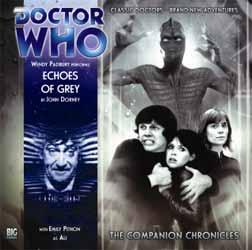|
Click here to return to the main site. Audio Book Review
Zoe Heriot has a photographic memory - total recall - but when it comes to the years she spent travelling through time and space in the TARDIS, all she can remember is that she has forgotten. Decades after she was returned to the Wheel in Space by the Time Lords, Zoe meets Ali, a young woman who claims to have met Zoe before, when she was with the Doctor and Jamie. Suddenly, part of her hidden past is exposed, as memories return of a visit to the Whitaker Institute in Central Australia. Secrets are uncovered, and the mystery of the Achromatics is about to be unleashed... The prominence of the frame narrative in each of The Companion Chronicles compared to the adventure that is actually being recalled by the companion varies from one release to the next. With some companions, a certain degree of exposition is essential in order to explain how the character can remember the events at all. In the case of Sara Kingdom, this is because she’s supposed to be dead. With Jamie and Zoe, it’s because they’re not supposed to remember, because the Time Lords erased their memories at the end of The War Games. As with Fear of the Daleks, the frame narrative of Echoes of Grey concerns an amnesiac Zoe (Wendy Padbury) who begins to remember some of the time she spent with the Doctor and Jamie, on this occasion with the aid of a woman called Ali (Emily Pithon), who says she met Zoe during that fateful adventure. Without its frame narrative, the flashback story of Echoes of Grey, which takes place between The Seeds of Death and The Space Pirates, would be a fairly standard sci-fi cautionary tale of scientific good intentions gone awry. The story’s message and duration are more akin to an episode of Star Trek or The Outer Limits than the Patrick Troughton era of Doctor Who - though the Whitaker Institute is a neat tribute to David Whitaker, the writer who originated the character of Zoe in The Wheel in Space. However, the final disclosure of the frame narrative turns our assumptions about what we have heard on their heads. Writer John Dorney achieves this without any of the disappointment that accompanies revelations of the “so, it was all a dream” variety, or the annoyance of not knowing which bits of the story are true and which are false (yes, Mindwarp, I’m talking about you). The entire story lasts for nearly 80 minutes, so there’s unfortunately no space on the disc for extras. However, once you’ve listened to the CD for the first time, you can play it again with a new perspective and the understanding that nothing is black and white - even when it concerns the Troughton era. 7 Richard McGinlay |
|---|

